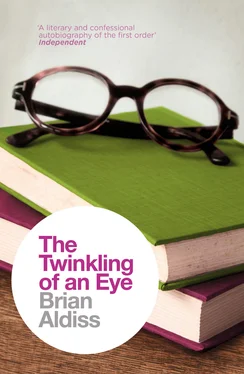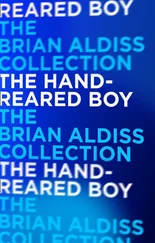‘We may have to defend the street. You never know,’ he said. ‘Keep it clean.’
The gun was mine. Later, I almost killed my father with it.
At school, we all joined the OTC, the Officers Training Corps, and wore uniform. I became a good shot. When we weren’t playing rugger or running round the countryside, we went on military exercises through the local farms. The romps were enjoyable, even in pouring rain, when we wore stiff gas capes. One learnt useful things in the OTC, how to read a compass, how to read a map, how to sneak into an out-of-bounds pub for a pint of cider.
The war was going depressingly badly. After the fall of France, Britain stood alone against the horrible black machine devouring the continent. Bill built an air-raid shelter outside the back door. Dot bought a wind-up gramophone to cheer us up when air raids were in progress.
Once, when a raid was on, we trooped down to the shelter and sat there for an hour or two by candlelight. The shelter proved to be rather damp. After that, Bill used the place as a bacon store, while Betty and I took over the gramophone, on which to play, among other favourites, ‘The Ferryboat Serenade’, ‘Elmer’s Tune’, ‘Green Eyes’, ‘The Hut-Sut Song’ and ‘The Memory of a Rose’.
We lay awake at nights, listening to Dornier engines, like an ischaemic event in the lower cerebellum, as Goering’s Luftwaffe flew overhead. The Dorniers came in squadrons, passing very slowly, throb-throb-throb … The distinctive noise rolled down our chimneys. Listening, you felt as an animal feels, hiding when hunters are near.
One night at midnight, Bill roused me from my bed and we walked up the village to climb Belmont Hill, from whence there was a good view of the surrounding country.
A glow lit the whole sky to the south.
‘Exeter’s getting it,’ Bill said.
Later, we drove to Exeter to witness the extent of the damage. Most of the city had gone. Rubble had been cleared away by then. Nothing remained. Nothing, except the cathedral, which stood alone on an unearthly flat plain. Here and there, as we drove, we passed an occasional lamp standard which remained upright. No living person was to be seen; those unburied had decamped to adjoining villages. The Germans had wiped the city off the map. In this surreal landscape, Air Marshal Hermann Goering had done Salvador Dali’s work.
The English, so tolerant, so enduring, so brave, during World War II, became a lesser race after the war. Exeter was rebuilt as an anonymous town, without that sense of style its old black-and-white buildings had conveyed. Little memory was retained of what it had once been. The Germans, Poles, French rebuilt their cities according to old plans and photographs, effecting smart restorations and canny improvements. British town planners held no such reverence for what had been, as they plugged the standard chain stores into the city centres. The English made no great protest at what was happening.
The blackout lent an enchantment to banal village streets. On more than one occasion, we climbed Belmont Hill to watch the Luftwaffe at their work of destruction.
Far distant, as if an angry planet were about to rise, a fan-shaped light would grow on the horizon. We stood silent on the hill to witness the raid on Plymouth. Even the burning of distant Swansea was visible. Hundreds of civilians died, and with them fabrics and traditions of an earlier age.
After witnessing the air raids we would walk back down the hill, and huddle in the little kitchen behind the shop while Dot made us cups of tea. By the time we were in bed, we would hear the Dorniers returning to Germany. Throb-throb-throb, down the chimney again.
On Belmont Hill stood a small public school, run by a regimental sergeant-major posing as headmaster. The dramatist John Osborne, four years my junior, was incarcerated there as a boy. He used frequently to come down to our shop to buy a packet of Player’s ‘Weights’, whereupon he became friendly with Dot. Growing sick of the sergeant-major, Osborne dotted him a punch in the eye, for which he was expelled.
One great advantage of the blackout was the darkness everywhere, allowing the stars and Milky Way to shine clearly. With my little Stars at a Glance in hand, I used to stand on top of our air-raid shelter and watch the constellations. How peaceful were those regions of fire – so different from Exeter burning. Surely in the marvellous beauty of the night sky lay some hope for humanity, war or no war.
Since then, I have stood in the Dandenong Hills in Australia and looked up at a different sky. All the familiar populations of the northern hemisphere have gone. It is as if one stood on a different planet. Even the night sky seen from Mars would appear less alien: the Plough, Cassiopeia, and other constellations would look much the same from Olympus Mons as seen from our air-raid shelter. The distance between Earth and Mars is so short, if insuperable as yet.
At West Buckland, things settled down. The headmaster, Sammy Howells, was a master of sarcasm. He wore pince-nez and had a ginger moustache. The lapels of his suit were permanently discoloured by a W. D. & H. O. Wills’ product, Gold Flake cigarettes. Ciggies must have served him as dummy and mistress, and fumigated the perpetual pong of small boys from his nostrils.
To give the devil his due, he ran a tight ship in stormy times. Sammy was a brilliant teacher of English and in particular of English grammar. With his withering tongue, practised at dissecting the language, he could take any unfortunate boy apart. I relished those lessons, much as I feared Sammy. He took a particular dislike to me, calling me ‘The Comedian’. Sammy liked to be the one making the jokes.
It was noticeable that when he picked on one boy in the class, everyone else laughed fawningly, protecting themselves from the line of fire. They also professed to like him, for the same reason. I really hated Sammy. The old bastard died just before my first book was published. The smokes got him in the end. His lungs went. Poor Sammy Howells – a good headmaster, a brilliant teacher, a dedicated man, a shit.
One thing stands for ever to Sammy Howells’ credit. Whenever Winston Churchill was due to address the nation, Sammy had us all assemble in the Memorial Hall to listen to his speech. Listen we did to that great master of oratory, during those testing years the inspiration of our country.
Obtaining masters to teach was a wartime problem. Most of them had been called up into the Forces. Sammy engaged two conscientious objectors. One was a mathematics teacher, a Mr Coupland, immediately nicknamed, with cruel perception, Chicken Coupland. Coupland knew much maths but could not convey it. Despite furious beatings, liberally dispersed, he could not make us learn. I regret it; I never entered the world of maths, on which most sciences depend.
Mr Foster was a strange man, a refugee from somewhere. We tended to make fun of him. He was known as Mitabout Foreskin, a Bowler christening. Then he took us for a German lesson, and sang ‘Roselein’ to us in a beautiful tenor voice. From then on we were much more respectful.
‘Crasher’ Fay taught us German and English in the upper forms. Most lessons were enjoyable. It was the boredom after class, the lack of privacy, the noise that got to you. All well exemplified in Lindsay Anderson’s film of public school life, If …
The truth was that the hardships of wartime Buckland, together with the rigours of the climate – over eighty inches of rain a year, compared with East Dereham’s twenty-eight – formed a common bond between masters and staff. Once a term, a barber and his assistant would drive out from Barnstaple on rationed petrol and cut the hair of every boy in the school, working steadily all day, class by class. We went in to the torture chamber maned like lions, to emerge as criminals, scarred here and there by the hasty razor. Of course we laughed, unaware that similar shavings were taking place in Auschwitz and Buchenwald.
Читать дальше












